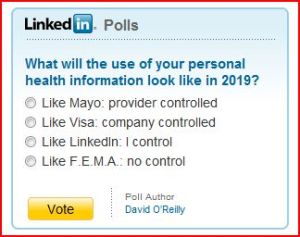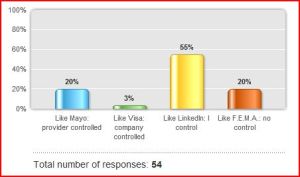When our drugs, medical devices and wellness tools become smart, and when the resulting personal health information is linked to mobile and internet-based systems, who or what is going to control all that? A poll was conducted to find out what people think the use and control of such personal information will look like in ten years from now:

The poll was done on the LinkedIn business social network. LinkedIn provided a very quick and easy way to poll (e.g., posting to completion was done in just a few hours), but the tool has some big limitations. The poll is small (54 responses) and not statistically significant because they place payment requirements on larger polls. In addition, the wording length, and therefore the ability to convey the full meaning of an answer, is severely constrained by the LinkedIn tool. You can find the complete results here, including analysis by respondent title, company size, job function, age and gender (membership required).
The goal was to contrast the current use of personal health data (controlled by providers like the Mayo Clinic) with three possible futures–control by consumer and health services-focused companies (like Visa does today for similarly sensitive financial information), control by the individual (like LinkedIn and Facebook allow us to do today for our personal relationships), and a bleak, out of control situation (like FEMA during Katrina). 55% of those polled think they will be in control of their personal health information in 10 years. This endorsement of the future health-empowered individual was tempered by 40% who thought the situation would look either similar to today (like Mayo Clinic) or worse (like FEMA). Only 3% thought the future of our health information looked like Visa.

There are some interesting nuggets in the demographics behind the poll results. People from medium sized companies had the most mixed responses: 44% Mayo, 22% Visa, 22% LinkedIn, and 11% FEMA. Do these companies struggle the most with our current healthcare system and appreciate complexities that will shape and limit the future that others do not? In the age demographic, the older the respondent, the less likely their answer was for a future that looked like the provider control of information we see today: 33% of age 18-24 bracket, 20% of age 25-34, 16% of age 35-54, 0% of age 55+. As we get older and increasingly confront disease and health challenges, do we recognize the need to control our health information more and not rely on institutions? In the gender demographic, 36% of women vs. 15% of men thought our health information future looked like FEMA! Do women see our healthcare system in ways men do not because they have a different window on their own care and that of their children and elderly parents? If so, isn’t it critical that women have an increased voice in the development of health policy and new health innovations, services and products?

































